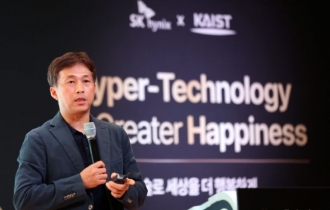[INTERVIEW] Crucial Tec takes formidable lead in on-display fingerprint scanning
[THE INVESTOR] For Charles Ahn, it is only a matter of time before seeing a new smartphone that can authenticate a fingerprint on a display, rather than under it, thereby vastly improving the accuracy.
Ahn, chairman and CEO of Crucial Tec, a Korea-based biometric solution developer, has been making various investments for the development of the company’s patented Display Fingerprint Solution, or DFS, since 2012.

Crucial Tec Chairman & CEO Charles Ahn speaks during an interview with The Korea Herald on July 31. Crucial Tec
“Our technology is fully ready, and we are in talks with the world’s leading display manufacturers to develop the first smartphone with the DFS,” Ahn said in an interview with The Korea Herald at the company’s headquarters in Pangyo, Gyeonggi Province.
There is an ongoing race among global smartphone makers to introduce smartphones with on-display fingerprint authentication solution, and Crucial Tec is at the center of the competition since it owns the largest number of patents related to the solution and technologies.
“Crucial Tec is the only company in the world which possesses all five technologies required for high-quality on-display fingerprint authentication – sensor integrated circuit (IC), chip packaging, module, algorithm, mobile firmware,” Ahn said. “The key to being able to commercialize such smartphones is to well match display panels with our sensor and drive ICs.”
Samsung Electronics had attempted to adopt the on-screen fingerprint solution for its flagship Galaxy S8 smartphone early this year, but halted the development due to technological hurdles.
Apple has also reportedly given up on development of a touch sensor IC for the upcoming iPhone 8, which would have enabled both screen touching and fingerprinting on a single display, according to foreign news reports this week.
Considering that Samsung and Apple are both struggling to release such smartphones at the moment, the ball is in Crucial Tec’s court.
Crucial Tec was the world‘s first to supply its fingerprint solution Bimetric TrackPad, known as BTP, for Huawei, Meizu, OPPO, Vivo, Google, MS, Sony, Fujitsu and LG Electronics. It provided the solution to Fujitsu‘s Disney smartphone series and Pantech‘s Vega LTE-A in 2013, slightly earlier than Apple’s iPhone 5S series.
The company’s DFS is based on transparent touch screen pads with a hybrid IC that processes fingerprint authentication and touch screen sensing simultaneously. Other companies are currently developing similar solutions based on opaque IC chips either with an optical or ultrasonic method, which have lower yields than the DFS, according to Ahn.
Since the hybrid IC is placed just under the tempered glass of the smartphone, and right on the display panel, accuracy of fingerprint authentication and touch screen sensing improves, the CEO explained.
By using transparent electrodes, the DFS has reached 90 percent in clearness of viewing the display, which is the same level proven in existing smartphones without the additional display fingerprint solution.
Crucial Tec’s main rival Authentic, acquired by Apple, has developed a solution to place the fingerprint sensor IC under the main display panel, which could be less accurate than the DFS, according to a company official.
“Our efforts go back five years when we first saw the need to develop the solution as the size of display panels for mobile phones got bigger and bigger,” Ahn said. “And we had reached 50 percent in clearness three years ago, and further improved it to 90 percent, a very significant improvement.”
“The only remaining challenge is to overcome the glass in order to raise accuracy of touching and personal authentication by continuing to improve the sensor capabilities,” he added.
According to Strategy Analytics, there would a total of 1.6 billion units of low and mid-end and premium smartphones with fingerprint authentication solutions by 2020, up from 850 million units this year.
“We are already feeling the needs from the market,” Ahn said. “That is why we are continuing to invest in the DFS to improve further, including developments of follow-up technologies, despite some deficits.”
The company allocates at least 10 percent of its annual revenue for research and development, Ahn said.
Last year, the company posted 320 billion won in sales and 8.3 billion won in operating profit. But in the first quarter of 2017, it saw a 7.8 billion won operating loss due to the R&D costs, despite 43.3 billion won in quarterly sales.
“We have already started investing in technologies for the next five years,” he said. “The area of the new techs will be mobile healthcare, which will be mainly based on Internet of Things technologies. We will never stop investing.”
By Song Su-hyun/The Korea Herald (song@heraldcorp.com)
EDITOR'S PICKS
- Seoul shares rattled by Israeli attack on Iran; Kospi dips to nearly 11-week low
- S-Oil donates W560m to support firefighters
- LG CNS teams up with Yonsei University to nurture AI specialists
- Polestar 4 to make Korean debut in June
- S. Korea pledges W23tr venture capital fund for green investment at G20 meeting
- Sungsimdang outperforms bakery giants to log sales over W100b
- France rejects opening Paris flight routes to T'way Air, deals blow to Korean Air merger
- SK hynix chief underscores chip cooperation between Korea, US















